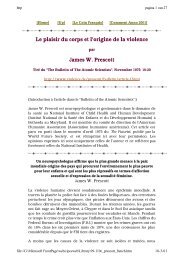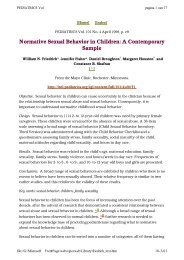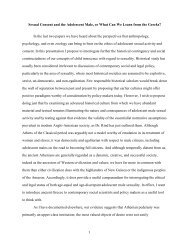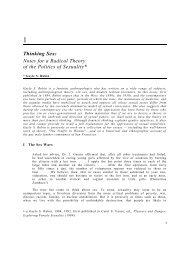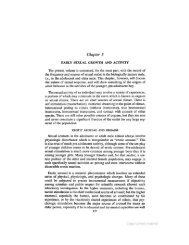Infant and Child Sexuality: A Sociological Perspective - Ipce
Infant and Child Sexuality: A Sociological Perspective - Ipce
Infant and Child Sexuality: A Sociological Perspective - Ipce
You also want an ePaper? Increase the reach of your titles
YUMPU automatically turns print PDFs into web optimized ePapers that Google loves.
I remember one scene very well. He had an older<br />
sister. Now that sex was beginning to interest<br />
me, I wanted to know what his sister was like.<br />
In short, I had very little knowledge of girls.<br />
He described her very unattractively. In fact,<br />
it made me somewhat nauseous to think of a girl<br />
in respect to her genitals.<br />
My first encounter with sex as a reality was<br />
when I was about seven or eight. A helpful older<br />
friend casually offered me a rather vague definition<br />
of coitus. I wasn’t really at all sure of<br />
what he meant. It seemed like a strange thing to<br />
do with a girl as the thought had never entered<br />
my mind before. There was no desire on my part<br />
to learn anything more about it at the time.<br />
The differential encounters provided in the social milieu contribute<br />
more to a child’s sexual knowledge <strong>and</strong> experience than do his physiological<br />
readiness or his sex interest. Interest in coitus <strong>and</strong><br />
knowledge <strong>and</strong> acceptance of premarital coitus is well established among<br />
boys age seven in some communities, <strong>and</strong> in some instances as early as<br />
four years of age. (Kinsey, 1948, p. 377). Especially in some urban<br />
communities, by age seven boys know that coitus is one of the activities<br />
which most of their older acquaintances are engaging in; <strong>and</strong> they<br />
have already learned that coitus is one of the things considered highly<br />
desirable. Much of this sexual sophistication comes from associating<br />
with older companions. <strong>Child</strong>ren overhear adolescent boys talking to one<br />
another about naked women <strong>and</strong> couples who have had sex relations. (Rogler<br />
<strong>and</strong> Hollingshead, 1965, p. 135). The size <strong>and</strong> shape of a woman’s<br />
vagina are topics of conversation among boys <strong>and</strong> men, <strong>and</strong> younger boys<br />
learn from older males that women are objects of sexual gratification.<br />
As a consequence, they orient their thoughts <strong>and</strong> behavior in accordance<br />
with what other males expect of them as young, on-the-make machos.<br />
Kinsey found that the boy from the comparatively sheltered upper<br />
socio-economic level home, on the other h<strong>and</strong>, was not exposed to such<br />
experiences <strong>and</strong> was likely to confine his sex play to exhibition <strong>and</strong><br />
manual manipulation of the genitalia. He does not attempt coitus because,<br />
in many instances, he has not learned that there is such a possibility.<br />
In spite of their limited contact with coitus or information<br />
about coitus, children raised in homes of educated parents have often<br />
seen adult genitalia at an earlier age, however, primarily because of<br />
the greater acceptance of nudity in their homes than in lower-class<br />
homes. (Kinsey, 1953, p. 112).<br />
An adolescent boy who has already experienced coitus is not likely<br />
to make sexual advances toward a child, but if he does, his prior sexual<br />
experience will affect his conduct. The trauma of the girl child<br />
involved in the following case is apparent.<br />
I was five <strong>and</strong> the oldest. My sister was four<br />
<strong>and</strong> my brother barely two. We were visiting some<br />
relatives on the farm. For lack of anything better<br />
to do, my cousin suggested that we play<br />
“doctor” <strong>and</strong> call the tool shed the “doctor’s<br />
office.”<br />
46



